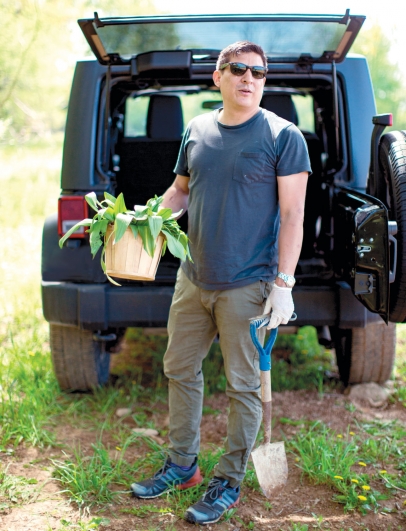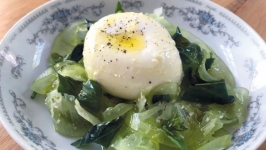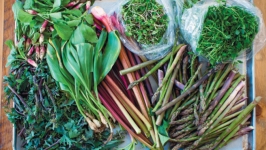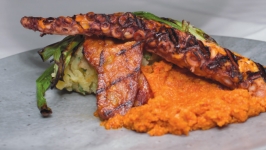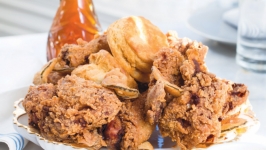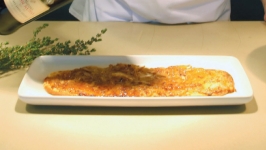No Place Like Home
Chef Josh DeChellis of Juniper Hill shares the treasures of Hunterdon County
Chef Josh DeChellis, in Ray-Ban sunglasses and his signature Adidas sneakers, surges along County Road 617 in his 2013 Jeep. The windows are open wide, and a hustle of a May breeze churns the morning. DeChellis, barely slowing, abruptly turns, and the Jeep bounces and lurches. The path feels like a secret, so narrow as to be nearly invisible, the deeper ruts bolstered by clusters of field stones. Back in the day, DeChellis drove a MINI Cooper through the streets of New York. It’s clear that he loves every off-road minute.
DeChellis circles the field, stopping the Jeep near the tree line. He grabs a shovel and a pair of scissors from the back. He and Jon Smith, of Two Barn Farm, have spotted some ramps.
The sustainable way to forage ramps is to take the bulb without destroying the roots. DeChellis exposes the roots with his shovel, carefully snips the bulb and smothers the roots again with dirt. He wears surgical gloves, but not because the work is precise.
“Dude, there’s just as much poison ivy here as there are ramps,” says DeChellis.
“I used to get it so bad as a kid,” says Smith. “I used to get it on my face.” Smith, an economics major turned ski bum turned farmer, is not so removed from his days as a kid.
“Dude, that’s brutal.”
The chef and the farmer continue their stories of poison ivy, but neither seems deterred from the ramps. DeChellis says he had a severe reaction to poison ivy two weeks ago, and soothed his itch with industrial strength kitchen degreaser. His arms are readily branded as chef ’s arms, showcasing wince-worthy scars from various burns and cuts. These, along with his recent knee surgery, are the forensics of the business. Yet his arms bear no evidence of a rash.
The farmer forages more quickly than the chef, and soon a small basket is filled. The smell—garlicky, oniony, woodsy—is lifted by the breeze. It is the smell of defiance, of spring besting winter, of life.
Josh DeChellis was born in Colombia and grew up in Clinton. He took a restaurant job at the Frenchtown Inn after he graduated from the Culinary Institute of America in 1996. But he left New Jersey years ago to embark on what has been a remarkable crescendo of a career in an industry that often devours its best and brightest. He’s worked at L’Arpege, Bouley, Jean-Georges. He’s been chef at Sumile (NYC and Tokyo), La Fonda del Sol, Il Buco Alimentari. He was culinary director for Rocco DiSpirito. He’s earned numerous starred reviews and Michelin recommendations, and is among an elite group of US chefs, along with Thomas Keller, Charlie Trotter and Wylie Dufresne, invited to Madrid Fusion, a worldwide gastronomy summit. The restaurant critics of New York agree that his food is daring, but also that he’s a modest chef, a talent without pretense.
In 2017, DeChellis opened Juniper Hill in Annandale, a community within Clinton Township. The locals expressed surprise that a fancy New York chef was coming to 73 Beaver Ave., but the restaurant was embraced from the beginning. A year later, Juniper Hill is often abuzz on a Tuesday night, which, in tiny Annandale, is no small achievement.
Still, a curious thing happened to DeChellis when he returned to his childhood home. He found himself rediscovering Hunterdon County, seeing it fresh. Like Dorothy Gale after her own Technicolor adventures in the Emerald City, he seems astonished to discover there’s no place like home.
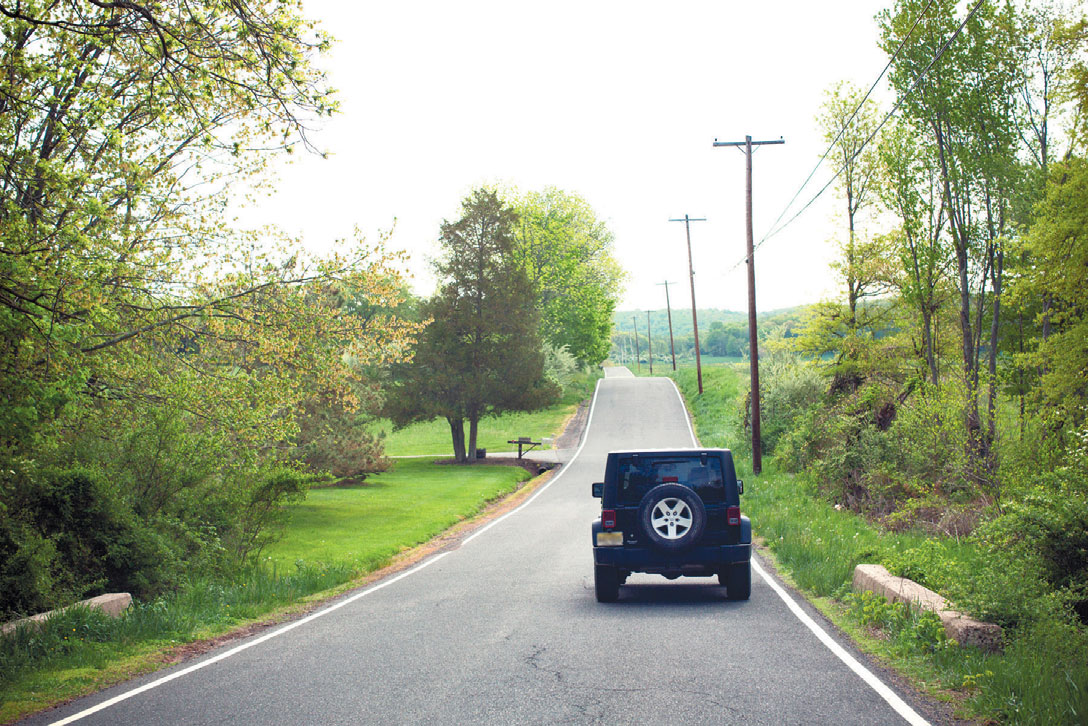
“Cooking starts here,” says DeChellis, pointing to the fields. “More happens here than what happens in the kitchen.”
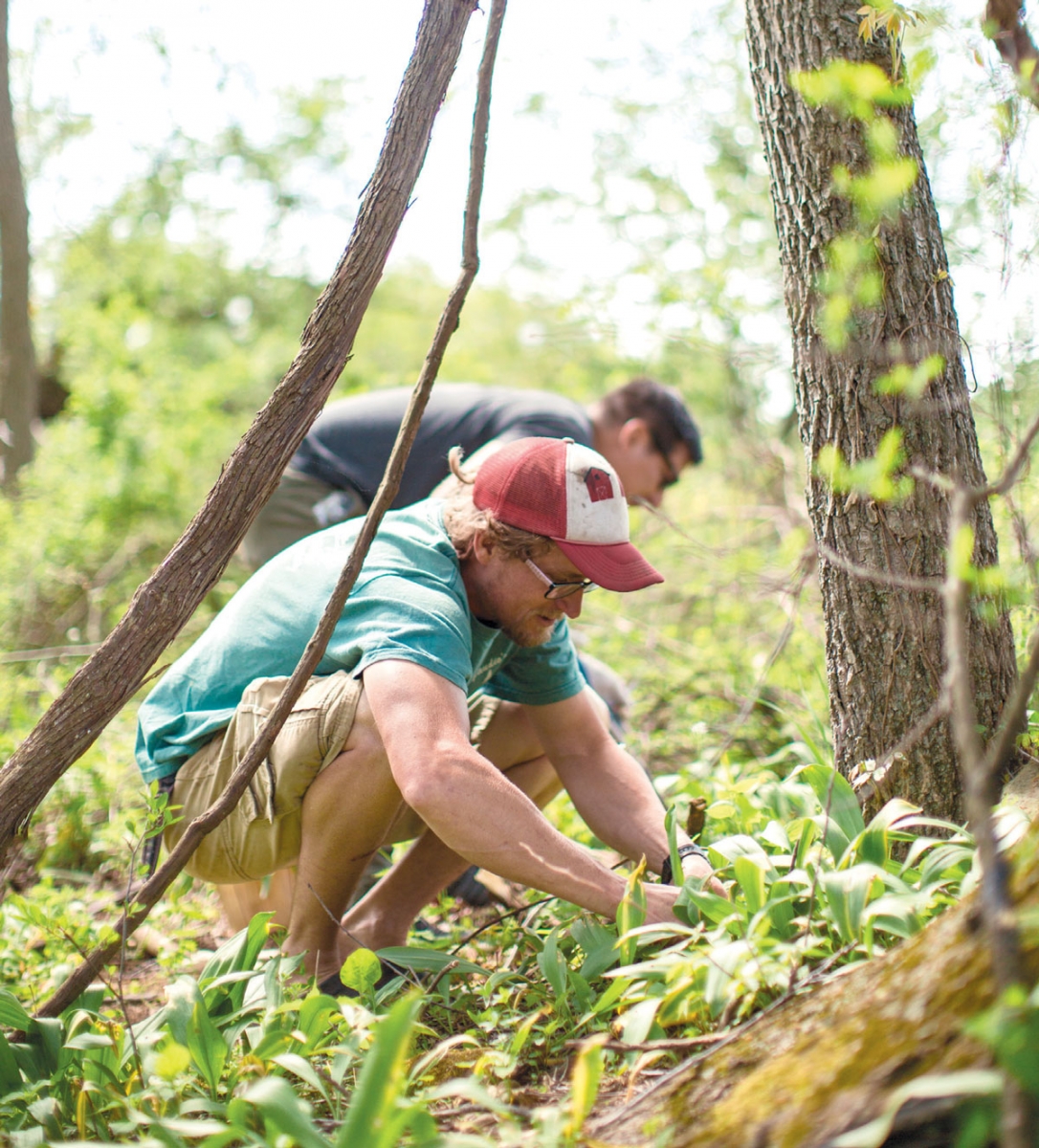
Before the restaurant opened, DeChellis took two plots at the local organic community garden, just to see what would happen, planting lemongrass, melons and other exotic produce. He was blown away, he says—first by how much work it involved, and then by how rewarding it was. The bounty was unexpected. “They took,” he says, still surprised. “They all took.”
Today he doesn’t have the bandwidth to grow his own produce. Instead, he’s commissioned other like-minded growers to cultivate the produce he prefers. And he’s found any number of unexpected culinary treasures in his own back yard. As a chef in New York, he shopped the stalls at Union Square Market. In Hunterdon, he goes directly to the source, pulling rhubarb from the earth and trout from the water. Many of his favorite vendors are within 10 miles of the restaurant, and the superiority of the ingredients is palpable. “The best stuff always stays close to home,” he says. “Cooking starts here,” he says, pointing to the fields. “More happens here than what happens in the kitchen.”
In many ways, DeChellis was like many of the professionals who now live here, lured as they were by the straight-shot commuting ease of Route 78 and Route 287, the wide highways funded by AT&T and Bell Labs to assure a modern, accessible environment for their employees. Meaning that DeChellis, a local, had no idea about the life that teemed beyond the main roads.
Now that he’s tuned in, DeChellis is eager to share. In the back of his Jeep, a cooler is filled with ice, and the chef is ready for a road trip, a spring day to visit some of his favorite farmers and artisans.
There’s Tom, the asparagus guy, who sells his harvest for $2.50 a bunch via the honor system. And the Mangalitsa farmer, whose sow delivered a litter of 11 this spring. And the local hatchery, which supplies some of the top restaurants in Manhattan. In Pittstown, there are all the elegant vintages produced by Mount Salem Vineyards; DeChellis found the winery thanks to his barber. And Conclave, a local brewery, which offers a stout so rich and buoyant that the chef thought immediately of a beer float, and created a rich, triple-vanilla ice cream to pair with it. The stout float at Juniper Hill remains popular.
This immediate, tactile experience with the ingredients has changed the way DeChellis thinks about his menus. In the mind of this chef, creativity is sparked by the surprisingly sweet taste of a leaf of baby Swiss chard, which carries all of the plant’s characteristic minerality, but none of the bitterness. Creativity is not a calculation made under the artificial lights of a stainless steel kitchen.
At Two Barn Farm, the rows of strawberries are beginning to blush, and radishes slide from the dirt like so many princess necklaces. “Omigod, dude, these are so pretty.” The radishes appear later on the evening menu at Juniper Hill, a simple celebration with butter and salt and grilled toast, their vibrant greens intact.
With the foraged ramps, the farmer talks of a ramp omelet, a breakfast with freshly laid eggs. The chef will serve pizza with sheep’s milk ricotta, spring onions and ramps. He will also prepare a pickled ramp brine, which he serves with halibut. The brine is hauntingly good, the umami of spring, clinging to a spoon. The philosophy behind it is something he learned in Japan.
The Temple of the Dragon at Peace
It was in Kyoto, doing culinary research before the 2003 opening of his West Village restaurant Sumile, that DeChellis developed his life philosophy. Sumile was owned by Miwa Yoshida, a pop star so famous DeChellis calls her the Madonna of Japan. In Japan, DeChellis, as part of the celebrity entourage, toured with a translator. It was six weeks of the country’s best food, but also exclusive experiences and a depth of communication unavailable to the average American business traveler.
Kyoto is a bustling, modern city—steel and glass buildings, bullet trains, clogged streets. Yet Kyoto was the capital of Japan for more than a millennium, and is also a city of cherry blossoms and hidden ancient temples. At the hotel one evening, DeChellis was told his next morning would begin at 4:30am.
DeChellis was taken to Ryoan-ji, the Temple of the Dragon at Peace. It is a Zen temple, and home to the world’s most famous rock garden, a collection of 15 rocks, small and large, strategically placed in a rectangular bed of pebbles. Part of the garden’s mystique is that one rock is always hidden from view, no matter the vantage point. To see the 15th rock, it is said, is to achieve Enlightenment. The goal of the garden is to encourage meditation. Beyond the garden, foliage blooms.
The temple is one of Kyoto’s most popular attractions, and the early-morning excursion was planned to allow DeChellis to experience the energy of the temple in solitude. The chef recalls a particular wall, where the foliage outside met the foliage inside, as if holding hands. “It was that moment I found my path.”
He realized with clarity that it was not his purpose, as a chef, to put a stamp on something, to create a unique dish or style, as so many New York chefs were striving to do. Instead, he would aim for co-existence.
The rock garden is manmade, but natural. Warm but austere. Balanced. “Japan did it for me,” he says. “Living with nature, living with others, the humble culture, the quiet celebration of the seasons.”
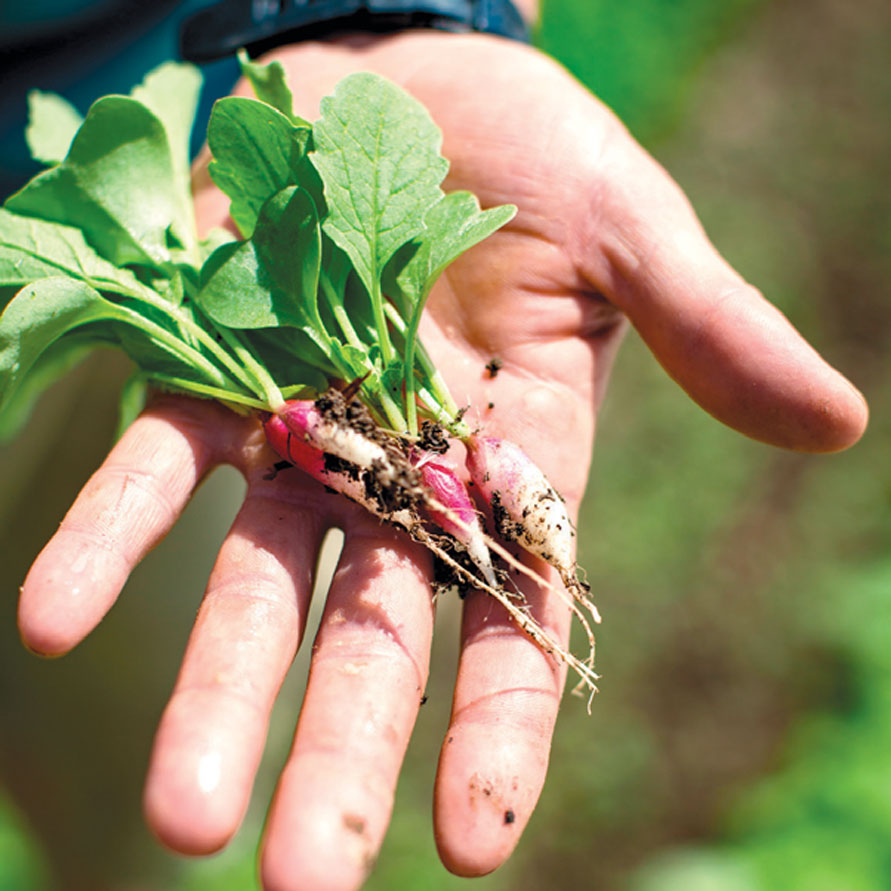
This immediate, tactile experience with the ingredients has changed the way DeChellis thinks about his menus.
A Mad, Heart-Attack Moment
In March 2014, DeChellis took a deep breath and placed a telephone bid on an online auction for one of the nine liquor licenses that serve Clinton Township. It was 3pm, and the chef was at the Port Authority Bus Terminal, commuting to his job as executive chef at Il Buco. When he learned that he’d won, it was a mad, heart-attack moment. DeChellis was not sure if he should feel fear or excitement. His business plan factored Hunterdon as one of the state’s wealthiest counties. But he also knew that most residents spent their fine-dining dollars elsewhere. If they wanted a New York experience, they’d simply go to New York. They were not likely to spend city prices on a local fine-dining restaurant. At least not often enough to support one. He’d have to figure out balance. Juniper Hill could not be a precious, special-occasion experience. Balance came into play in his personal life as well. Years after high school, he had run into a classmate, Jennifer Weinschenk. He saw her in New York and he just knew: “This was my quest.” Today, they are married and have two sons. The idea of living in Hunterdon County, near the grandparents, seemed ideal.
From the street, Juniper Hill bears the silhouette of the PNC bank it once was, a squat building with a generous parking lot. Inside, the transformation is remarkable (although, to dine here is to have a stranger at a nearby table note the location of the former drive-through window). Credit Jennifer DeChellis for the warm design, including the rustic barn doors that separate the dining room from the kitchen and the bar. Credit her father, Larry Weinschenk, for the wooden tables; those are repurposed from a dairy farm in upstate New York. Larry Weinschenk did all the sanding and refinishing; he’s also onsite every week to do whatever needs to be done.
DeChellis says he and his family thoroughly enjoy the spaciousness of Hunterdon County. And now that his commute time has been pared to mere minutes, DeChellis is available for his sons’ soccer games and back-to-school nights. One son requests the restaurant’s special party table, inside the vault, for his birthday parties.
In Hunterdon County, DeChellis still drives as if he’s in New York, a likely expression of both his assertive urban attitude and his love for the Jeep. He still works with the energy of a New Yorker, cramming more into a day than seems possible. He drops off the produce at the restaurant, and checks in with his general manager, Julie Gray, who has just driven an hour with a hive of bees in the back seat of her car. Bees matter, says Gray, and she’s doing her part. The bees are her personal project, a contribution to the planet.
Peter Leitner, the winemaker at Mount Salem Vineyards, says that some people—he is not one of them—view Hunterdon County as a culinary wasteland. DeChellis, he says, is raising the bar. Leitner believes Juniper Hill could be as significant to the county’s culinary history as the Ryland Inn. The winemaker is a former investment banker who spent years traveling to the best wine regions in the world, including his two-week honeymoon in 1999 spent primarily in Burgundy, France. He, like DeChellis, looks at Hunterdon County with wizened eyes.
“Had he not had those worldly experiences, he wouldn’t have appreciated what he found here.” Still, Leitner remains cautious. “Like all pioneers, he’s alone.”
In New York, a restaurateur must deal with the scene. In the city, like nowhere else, dining is entertainment, fueled by the gossipy culture of Eater. In New York, restaurateurs hope for—and fear—a visit from Adam Platt of New York Magazine, or Pete Wells of The New York Times. A sentence can change your life. More than once, DeChellis’s restaurants were put on deathwatch, that self-proclaimed diabolical Eater indicator of a restaurant’s demise, a prediction based on nothing but a writer’s intuition. Deathwatch is now defunct, but, in the city, the cutthroat snark remains. Once you leave New York, says DeChellis, you realize that so much of the chatter is just chatter.
In Hunterdon County, the scene isn’t New York intense. For some customers, the restaurant is just dinner, a sandwich and a beer or maybe a kale salad to go, picked up on the way home from work. It’s a slow, long game. It’s not time yet for Juniper Hill to open for lunch.
Dawn McBeth knows firsthand the difficulty of sustaining a local artisanal business. McBeth is founder of the Stockton Market and the former owner of Ambrosia, a longtime bakery in Stockton that recently closed. “It’s very challenging, and you really need the support of your community,” she says. Customers must be willing to spend more money for a special cut of meat or just-picked lettuce. Even in Hunterdon County, that sensibility doesn’t exist on a daily basis. “You’d like to think they’re there, but they’re really not.”
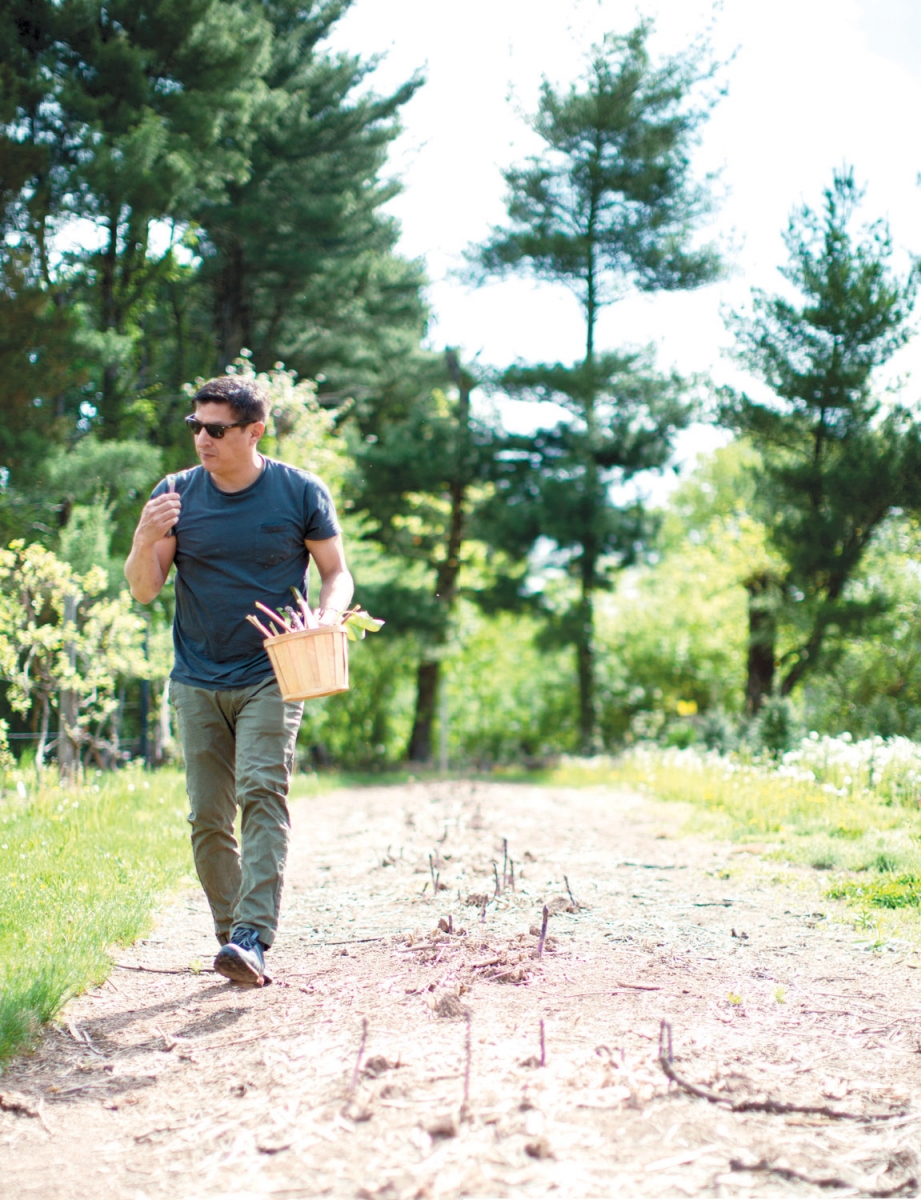
Stopped at an intersection, DeChellis is uncharacteristically silent.
“I was just sitting here, quiet, thinking how much I don’t miss New York.”
Moving along again, the wind hustles and DeChellis sputters. His allergies are acting up. Pollen has been brutal this season. Then again, they say that every year. “You just gotta roll down the windows and go full tilt.”
In the Jeep, despite the wind and the fact that the produce was unloaded hours ago at the restaurant, the smell of ramps—potent, sweet—lingers.
JUNIPER HILL
73 Beaver Ave., Annandale
908.335.8905
juniper-hill.com


